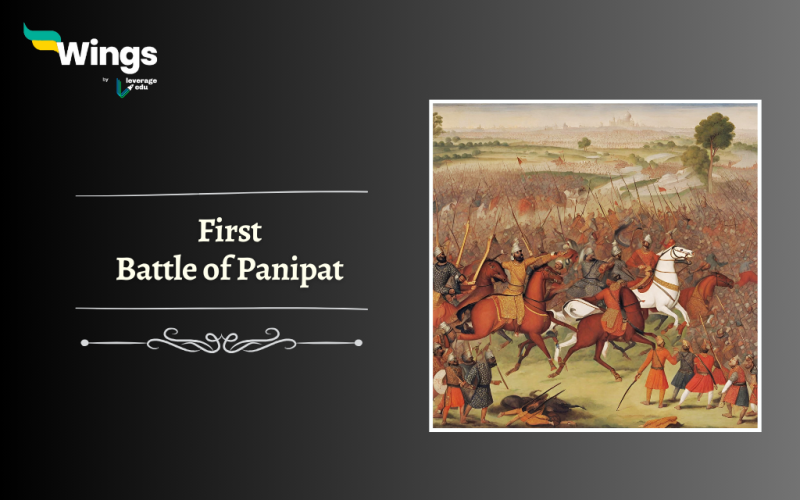The battle was fought in Panipat, a town in present-day Haryana between the Lodhi empire and the forces of Babur took place on 21 Apri 1526. This is called the “The First Batte of Panipat.” This marked the beginning of the Mughal Empire. The leaders from both parties were Ibrahim Lodhi and Zahir-ud-din Babur respectively. The former was the last leader of the Delhi Sultanate. Lodhi used guns to win over Lodhi. From the sound of these guns, the elephants from the army of Lodhi trapped their own men and collapsed. Many such war tactics helped Babur win the Delhi Sultanate in the first battle of Panipat.
Table of Contents [show]
| Babur’s Army | Lodhi’s Army |
| 15,000 men | 30,000 to 40,000 men |
| 20 to 24 pieces of field artillery | 1000 war elephants |

Result of the First Battle of Panipat, 1526
- The army of Ibrahim Lodi was much bigger than the human army of Mughal Emperor Babur, however, the techniques of the war of Babur were much more strategic.
- The ground of the Mughal empire was set after this war.
- The ruler of the Delhi Sultanate died on the floor which left the others abandoned. For instance, feudatories and generals.
Also Read – Who Won The First Battle Of Panipat?
Reasons for Babur’s Victory
- One of the major reasons for the victory of Babur was the usage of the gins on the field. The opponent outnumbered Babur in men’s forces, but not in techniques.
- The placement of troops by Babur made it possible for a major chunk of the army of the Delhi Sultanate to die at one point.
- Two of the key strategies of Babur were called- Tulghama and Araba. The former were the people of the army on the left, right, and centre and the latter meat carts were used to launch the cannon fire.
For more such interesting and informative topics on Indian History and more, stay tuned to our General Knowledge section. If you want to know more about studying abroad, reach out to our experts on Leverage Edu!
 One app for all your study abroad needs
One app for all your study abroad needs















 45,000+ students trusted us with their dreams. Take the first step today!
45,000+ students trusted us with their dreams. Take the first step today!
